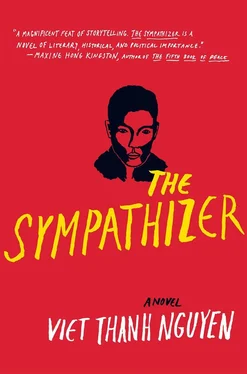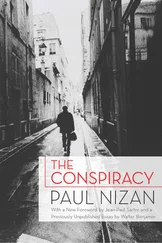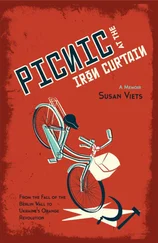Yes, I said, throat dry. Something may need to be done.
I had plenty of time to contemplate the General’s vague demand in the ensuing days. How could one disagree with something needing to be done? Something always needed doing by somebody. An ad in Sonny’s newspaper announcing that Lana was singing as part of a revue called Fantasia provided me the opportunity for action, although not the kind the General likely had in mind. What I needed was a vacation, if only for a night, from the stressful, solitary work of being a subversive. For a mole used to darkness, a nightclub was an ideal place to emerge. Persuading Bon to go to Fantasia to hear the songs and sounds of our gone but not forgotten country was less of a struggle than I thought it would be, for Bon, having decided to die, was finally showing signs of life. He even allowed me to cut his hair, which he afterward slicked down with Brylcreem until it matched our glossy black shoes. The Brylcreem and our cologne lent my car an intoxicatingly masculine atmosphere as we listened to the Rolling Stones, the car transporting us not only west to Hollywood but back to the glory days of Saigon circa 1969, after my return from America. Then, before Bon and Man became fathers, the three of us had wasted the weekends of our youth in Saigon’s bars and nightclubs, exactly as one was supposed to do. If youth was not wasted, how could it be youth?
Perhaps I could blame youth for my friendship with Bon. What drives a fourteen-year-old to swear a blood oath to a blood brother? And more important, what makes a grown man believe in that oath? Should not the things that count, like ideology and political belief, the ripe fruit of our adulthood, matter more than the unripe ideals and illusions of youth? Let me propose that truth, or some measure of it, can be found in these youthful follies that we forget, to our loss, as adults. Here was the scene of how our friendship first became established: a football pitch of the lycée, myself a new student surrounded by older, taller ones, the prancing steeds of the school. They were about to repeat a scene rehearsed by man from the dawn of time, the moment when the strong turn on the weak or the odd for sport. I was odd but I was not weak, as I had proven against the village comedian who called me unnatural. Although I had beaten him, I had also been beaten before, and I prepared myself for a losing fight. It was then that another new boy unexpectedly spoke out in my defense, stepping forward from the ring of voyeurs and saying, This isn’t right. Don’t single him out. He’s one of us. An older boy scoffed. Who are you to say who’s one of us? And why do you think you’re one of us? Now get out of the way. Man did not get out of the way, and for this he received the first blow, a slap on the ear that sent him reeling. I drove my head into the older boy’s ribs and knocked him down, landing astride his chest, from where I commenced to land two blows before his fellow oafs hurled themselves on me. The odds were five-to-one against me and my new friend Man, and even though I fought back with all my heart and rage, I knew we were doomed. All the other schoolboys surrounding us did, too. So why, then, did Bon jump forth from that crowd and take our side? He was a new boy who was as big as the older boys, true, but even so he could not beat them all. One he slugged, another he elbowed, a third he rammed, and then he, too, was brought down by the horde. So they kicked us, and hit us, and beat us, and left us bruised, bloody, and elated. Yes, elated! For we had passed some mysterious test, one that separated us from the bullies on the one side and the cowards on the other. That very night, we snuck out of our dormitory and made our way to a tamarind grove, and under its boughs we cut our palms. We mingled our blood once more with boys we recognized as more kin to us than any real kin, and then gave one another our word.
A pragmatist, a true materialist, would dismiss this story and my attachment to it as romanticism. But the story says everything about how we saw ourselves and one another at that age, as boys who knew instinctively that their cause was to stand up for the weaker. Bon and I had not talked about that incident in a long time, but I sensed that it was in his bloodstream as well as mine as we sang songs from our youth on the way to our destination at the Roosevelt Hotel. Once a swinging establishment on Hollywood Boulevard for celebrities in the black-and-white era, the Roosevelt was now as unfashionable as a silent film star. Worn rugs masked shabby tiles, and for some reason the lobby’s furniture comprised card tables and chairs with the spindly legs of cranes, ready for games of penny poker and solitaire. I had expected some residual splash of Hollywood glamour, with paunchy porn producers in butterfly collars and powder-blue blazers, leading demi-glazed women by their bejeweled hands. But the best-dressed people in the hotel appeared to be my fellow countrymen, bedecked in sequins, polyester, and attitude as we headed to the lounge where Fantasia waited. The other patrons, presumably the hotel guests, wore plaid shirts, pediatric shoes, and seven o’clock shadows, the only thing in tow an oxygen tank. We always arrived late for everything, including, apparently, Hollywood’s fashionable moment.
Nevertheless, the atmosphere inside the hotel’s cozy lounge was buoyant. Some entrepreneur had rented out the space to stage Fantasia , and the result was a refuge without any sign of refugees, the men sharp in tailored suits and the women delectable in ball gowns. Our aspiring bourgeoisie had found forty-hour-a-week jobs with overtime and, having padded their wallets enough to sit more comfortably, were now on the hunt for wine and song. As Bon and I settled into a table at the back, a winsome singer in a bolero jacket serenaded the lounge with a heartache-soaked version of Pham Duy’s “City of Sadness.” Was there any other way to sing about a city of sadness, the portable city carried by all of us in exile? After love, was sadness not the most common noun in our lyrical repertoire? Did we salivate for sadness, or had we only learned to enjoy what we were forced to eat? These questions required either Camus or cognac, and as Camus was not available I ordered cognac.
I paid for the snifters without a twinge from my dwindling settlement cash, being of the firm belief that money did not live until it was spent, particularly in the company of friends. When I spotted the grizzled captain and the affectless lieutenant standing at the bar nursing beers, I even sent them snifters of cognac. They came over to our table and toasted our comradeship, even though I had not yet brought up the matter of my return with the General again. That was my intent, though, and I was happy to buy us all another round. Cognac made everything better, the equivalent of a mother’s kiss for a grown man, and so it was that we indulged as the singers shimmied on the stage one by one. Men and women, they crooned, they wailed, they sighed, they belted, they moaned, they roared, and no matter what they sang or how, the crowd adored them. We were, all of us, even Bon, airlifted back in time by the lungs of the singers, across years and miles to nightclubs in Saigon where the taste of champagne, besides the usual flavors and hints, always carried a touch of tears. Too many tears, and one was overpowered; none, and one was not enslaved. But a drop of this elixir was all one’s tongue needed before it could utter only one name: Saigon.
That word was mentioned by nearly every one of the performers and by the emcee himself. This guide to Fantasia was a modestly built man modestly dressed in a gray flannel suit, the only shiny thing about him being his spectacles. I could not see his eyes but I recognized his name. The Poet was a writer whose works had appeared in the literary journals and newspapers, gentle and nostalgic verses about the textures of everyday life. I remembered one in particular about the epiphany to be found in the washing of rice, and while I could not remember the Poet’s epiphany, I remembered the urge in the poem to find meaning in even the meanest of chores. Sometimes, when I washed rice and sunk my hand into the wet grains, I thought of the Poet. I was proud to see that in our culture a Poet could be an emcee for a night of song and wine for the common people. We respected our poets and assumed they had something important to teach us, and this Poet did. He had written a few columns for Sonny’s newspaper, explaining the vagaries of American life or the cultural miscommunications between Americans and us, and in this vein he interspersed his introductions of the singers with brief lessons in our culture or the American culture. When it came time for Lana, he began by saying, Some of you may have heard that the Americans are a people who like to dream. It’s true, and although some say that America is a welfare state, in actuality it is a dream state. Here, we can dream of anything, can’t we, ladies and gentlemen? I will tell you what my American Dream is, he said, holding the microphone with the care one reserved for a stick of dynamite. My American Dream is to see once more, before I die, the land where I was born, to taste once more the ripe persimmons from the tree of my family’s garden in Tay Ninh. My American Dream is to return home so I can light incense at the tomb of my grandparents, to roam that beautiful country of ours when it is at last peaceful and the sound of guns cannot be heard over the shouts of joy. My American Dream is to walk from city to village to farm and to see boys and girls laughing and playing who have never heard of war, from Da Nang to Da Lat, from Ca Mau to Chau Doc, from Sa Dec to Song Cau, from Bien Hoa to Ban Me Thuot—
Читать дальше












